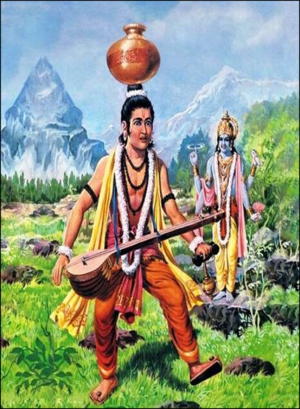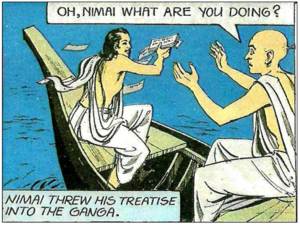Talk:Naiṣhkarmyasiddhi: Every action is an act of Worship
By Vishal Agarwal
The Bhakti Yogī performs a continuous worship of the Lord through every action. In fact, the Bhagavad Gita
exhorts that we must spiritualize our actions, including mundane ones like eating, charity and so on so that our lives are a continuous prayer and the light of the Lord radiates from us-
He from whom the natural activities (or duties) of all beings arise and by Whom all this is pervaded, by worshipping Him through the performance of his own duty does a person attains perfection. Gita 18.46
In his hymn Saundaryalahari, Shankaracharya prays that even his mundane acts become worship of the Devī-
Let my every word be a prayer to Thee, Every movement of my hand a ritual gesture to Thee, Every step I take a circumambulation of Thy image, Every morsel I eat a rite of sacrifice to Thee, Every time I lay down a prostration at Thy feet; Every act of personal pleasure and all else that I do, Let it be a form of worshipping Thee. Saundaryalahari, verse 27
In fact, the scriptures of Bhakti exhort us that we must continue to perform our worldly duties as always, but without a desire for any fruit accruing by their performance-
Till he does not obtain union with the Lord, he must continue to fulfill his world duties, but without a desire for the results of performing them. Nārada Bhakti Sūtra 62
The following stories illustrate how the adherents of Bhakti Yog perform their worship through every work they undertake.
Story: Nārada learns that work is worship if it is done for Bhagavān
Nārada Muni travelled continuously from one planet to the other, chanting praises to Bhagavān Vishnu. Sometime later, pride entered his heart and he came to think of himself as the greatest Bhakta of Vishnu. To confirm that his self-impression was true, he went to Krishna and asked Him, “Bhagavān, who do You consider to be Your best devotee on this earth?”
Krishna replied, “This question is really difficult to answer. But let me take you to the home of the farmer in Hemakūta. I think him to be My greatest devotee.” Krishna and Nārada changed their appearances and arrived at the farmer’s doorstep. The sun was setting, and the farmer’s wife had just served her husband and their two kids some food. Seeing strangers at his doorstep, the tired and exhausted farmer invited them inside and asked them if they needed anything. The visitors asked for some food.
The only food available was what the farmer’s wife had cooked. So the farmer gave his food to the stranger. The wife, seeing that their two visitors were still hungry, gave her food to them as well. The visitors further said that they were tired and wanted to sleep after dinner. As the farmer’s hut was very small, the couple and their kids went outside the hut to sleep and kindly gave their small hut to the visitors to sleep. Next morning, the farmer and his wife prepared some more food and served as breakfast to the visitors. Krishna (in disguise) then said that he wanted to go to the farmer’s field. So the farmer asked them to accompany him. There in the field, the farmer set to tilling the land laboriously with his bullock, explaining to Krishna and Nārada (in disguise) the tiring work of agriculture. After a few hours, when it was time for rest, Krishna asked the farmer, “You keep so busy all the time. You work in the fields all day. Then you go home, feed your buffalo. Your wife prepares meager food from the very little income you have. You eat it with your family, play a bit with your kids, ask about their school and then go to bed – completely exhausted. Do you ever get time to remember Bhagavān?”
The farmer replied, “I am a humble poor farmer that must work and work to feed my family and my buffalo. But three times in the day, I get a chance to remember Bhagavān. When I leave home and walk towards the field in the morning, when I walk back towards my home at sunset, and just when I am about to sleep in the night.” Nārada snickered when he heard that and thought to himself, “Ahh, he remembers Bhagavān only thrice. I remember Him thousands of time throughout the day. Perhaps Krishna has now understood that not this farmer, but I am the greater devotee.” Krishna read the mind of Nārada and decided to teach him a lesson. When the two visitors were about to leave, the poor farmer gave them a pitcher of oil as a gift, saying, “This oil is extracted from the mustard seeds that I cultivate. I’d be grateful if you’d accept it as a gift.” The visitors were charmed by the poor farmer’s generosity and left.
After they had gone some distance, Krishna suddenly said, “Nārada, I want you to place this pitcher of oil on your head, and walk carefully so that not a single drop spills out.” Nārada agreed. It was really tough for him, and he was nervous all the time. After an hour, Krishna asked him, “So how many times did you remember me Nārada, while you carried that oil pitcher on your head?” Nārada replied, “I was so nervous about spilling it that I did not dare to remember you even once.” Krishna smiled and said, “Look at that humble farmer Nārada. His life is so hard. He works the entire day for a meager income. He has the heavy responsibility of his family on his head, heavier than this oil pitcher. Yet, he continues to work day after day. And what is so praiseworthy, he has no pride in his heart, and he takes my name with devotion three times in the day. Do you think your life is tougher than him? Do you think he becomes inferior to you just because he does not remember me thousands of times in the day like you – you who are a wandering Rishi who does not have any responsibilities in life?”
Sage Nārada was humbled. He realized that the farmer performed his duties with devotion and without getting annoyed with his tough life. And yet, even though he remembered Bhagavān only three times in the entire day, the fact was that every action of that farmer was actually an act of worship. The triple prayer of the farmer was merely a formality to dedicate his day’s entire worth of good Karm to Vishnu! And nothing is more precious to Vishnu that we work hard, and then offer all of our good karm and its fruit to Vishnu.
Story: Chaitanya Mahāprabhu Writes His Scholarly Works Only to Please the Lord
Raghunath Pandit was one of the greatest scholars of his times, and lived in 15th – 16th cent. Bengal. One day, he was crossing the river in a boat with his dear friend, the saintly Shri Chaitanya Mahaprabhu. The Pandit said, “I have written a scholarly book on Nyaya (Philosophy of Hindu logic).” Chaitanya Mahaprabhu said, “What a coincidence! I too have written a book on the same topic and am carrying its manuscript with me right now. Let me read out a few passages to you.”
As Mahaprabhu did so, he noticed that Raghunath Pandit shed a tear from his eye. “Why are you crying my friend” he asked. The Pandit said, “I had thought that my book will make me famous. But I realized that your book is superior to mine. Now no one will be interested in what I wrote.
Suddenly, Chaitanya threw his own book into the river. He smiled and said to Raghunath Pandit, “I write these things only for the pleasure of Krishna. I have no desire to acquire wealth and fame, much less by undermining my own friend.”
Story: Bhakta Yamuna Devī Uses Her Skills to Serve the Lord
Radhanath Swami narrates the following biography of an exemplary devotee- “One of my dearest friends and someone I venerate as a truly saintly person is Yamuna Devi, who was born and raised in Oregon. At a young age, she dedicated her life to serving our Guru. She gave her heart to devotion to Krishna, and she put her soul into everything she did, mastering every art she pursued in service. In 1969 she and George Harrison of the Beatles became friends. George told Yamuna that with her voice, she could become one of the greatest female vocalists of her time, and he recorded her on Apple Records. After singing on a single that become number one in England and other parts of the world and with a career ready to take off, she decided to reserve her singing voice for her speaking, and especially her puja – was incredible.
In her home she spent hours a day making sacred offerings to her deities. Her altar was magnificent – not filled with expensive things, but with love woven in every intricate detail. Through her puja and chanting, she saturated her home and herself with bhakti. Everyone who met her or witnessed her puja – whether they were priests or atheists, hippies or Hell’s Angels, rock stars or villagers, grandparents or teenagers – was deeply moved. Upon witnessing the gravity of Yamuna’s character, wisdom, and love and seeing her devotion to her deity, even skeptics were transformed and had to admit that God was present. Seeing this, I too was transformed.[1]”
References[edit]
- ↑ Radhanath Swami. The Journey Within. Mandala Publications, 2016, pp. 172–173. San Rafael, California.



